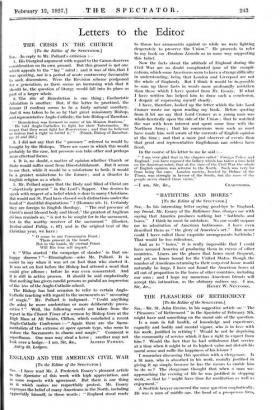ENGLAND AND THE AMERICAN CIVIL WAR
[To the Editor of the SPECTATOR.] have read Mr. J. Frederick Essary's pleasant article in the Spectator of this week with high appreciation, and in some respects with agreement. But there is one thing in it which makes me respectfully protest. Mr. Essary exPreTes the belief of many Americans in the North, including aPliarenily himself,- in these words : " England stood ready
to throw her armaments against us -while we were fighting desperately to preserve the Union." He proceeds to refer
to my -book on Abraham Lincoln as in some way supporting this belief:
Now the facts about the attitude. of -England during the Civil War are no doubt complicated (one of the compli- cations, which some Americans seem to have a strange difficulty in understanding, being that London and Liverpool are not the whole of England). But I think it would be impossible
to sum up those facts in words more profoundly mistaken than those which I have quoted from Mr. Essary. If what I have written has helped him to draw such a conclusion, -I despair of expressing. myself clearly.
I have, therefore, looked up the letter which the-lute Lord Cromer wrote me Upon reading my book. Before quoting from it let me say that Lord Cromer as a young man was whole-heartedly upon the side of the Union ;. that he watched the war with keen interest and spent some time with the Northern Army ; that his connexions were such as must have made him well aware of the currents of English opinion at the time ; and that a more just. observer of events than
that great and representative Englishman can seldom have lived.
In the course of his letter to me he said :—
" I am very glad that in the chapter called Foreign Policy and England,' you have exposed the fallacy which has taken a firm hold on the American mind, that at the time of the Civil War the whole of English opinion was adverse to the North. • Such was very far from being the case. London society, headed by Delane of the Times, was strongly in favour of the South, but the nums of the people never shared these views."










































 Previous page
Previous page